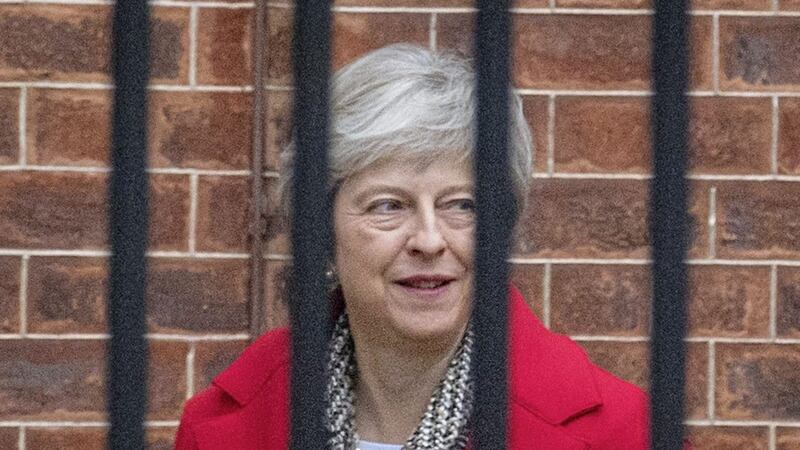AMBER Rudd has pleaded with Tory rebels to back Theresa May's Brexit deal after returning to the British prime minister's ministerial team following a raft of resignations.
The new work and pensions secretary told Conservative MPs it was "not a time for changing our leader" as she began efforts to shore up Mrs May's embattled position.
It came amid mounting expectation that Mrs May will face a leadership challenge – with her critics believing they have the numbers needed to trigger a vote of no confidence within days.
Stephen Barclay was also appointed by the prime minister as her new Brexit secretary. He stressed the need to "deliver a Brexit that works for the whole UK".
The reshuffle followed Thursday's resignations of Dominic Raab as Brexit secretary and Esther McVey as work and pensions secretary in protest against Mrs May's EU withdrawal deal.
Replacements were also announced yesterday for two junior ministers who resigned over the draft agreement.
John Penrose will join the Northern Ireland Office, replacing Shailesh Vara, while Kwasi Kwarteng will go to the Brexit department in place of Suella Braverman.
Stephen Hammond will take over from Mr Barclay at the health department.
The appointments came just hours after Brexiteer ministers Michael Gove and Liam Fox offered the prime minister a lifeline by staying on in their cabinet roles.
In the first act in her new job, Ms Rudd delivered a pointed message to colleagues.
"This is a time for pulling together, for making sure we remember who we are here to serve, who we are here to help: that's the whole of the country," she said.
"I worry sometimes colleagues are too concerned about the Westminster bubble rather than keeping their eye on what our job is – to serve people."
Ms Rudd was a prominent Remain campaigner during the 2016 referendum on whether the UK should leave the European Union.
She quit as home secretary in April in a row over immigration targets, but a report later concluded she had been let down by her officials.
The Brexit secretary role has been further downgraded as the prime minister will in future take sole control of negotiations with the EU.
Leave-supporting Mr Barclay's job will be limited to the domestic delivery of Brexit, preparations with or without a deal and shepherding legislation through parliament.
The North-East Cambridgeshire MP said: "We now need to keep up the momentum to finalise the withdrawal agreement and outline political declaration and deliver a Brexit that works for the whole UK."
Mr Barclay's appointment came after Mr Gove reportedly turned down the post, saying he would only take it if he could renegotiate the UK-EU deal.
Downing Street declined to say whether the post had been offered to anyone else before Mr Barclay, saying only: "He was the prime minister's choice for the job."
Mr Gove and Mr Fox's support has been seen as bolstering the prime minister's position as she faces the uphill battle of getting her Brexit deal through parliament.
Environment secretary Mr Gove said he "absolutely" has confidence in Mrs May, adding: "I am looking forward to continuing to work with all colleagues in government and in parliament to get the best future for Britain."
International trade secretary Dr Fox said he had "full confidence in the prime minister", adding that he hoped "across parliament we'll recognise that a deal is better than no deal".
However, Brexit-supporting ministers led by Andrea Leadsom are reportedly set to work on measures aimed at making the deal more acceptable to them.
Attempting to sell her deal directly to the public, Mrs May took calls on a half-hour phone-in on LBC.
Among the latest Tories to submit letters of no confidence in Mrs May as Conservative leader were former culture secretary John Whittingdale and ex-minister Mark Francois.
A total of 48 need to be submitted to the 1922 Committee to trigger a no-confidence vote.
Tory Brexiteer Steve Baker said after speaking to colleagues his count was "a little over 48" with another dozen "probable", but he acknowledged this may be inaccurate.
If Mrs May is ousted, Mr Baker said Brexiteers should agree on a single candidate – even if it meant potentially deciding the next prime minister by drawing lots.
But David Lidington, Mrs May's de facto deputy, said she would "handsomely" win any confidence vote.
Meanwhile, Labour indicated it would work with rebel Tories to block a no-deal Brexit if Mrs May's EU withdrawal plan fails.
Shadow Brexit secretary Keir Starmer said: "There are plenty of Conservative MPs who would not countenance us leaving without a deal and I think if it's necessary, we will work together to stop no deal happening."








